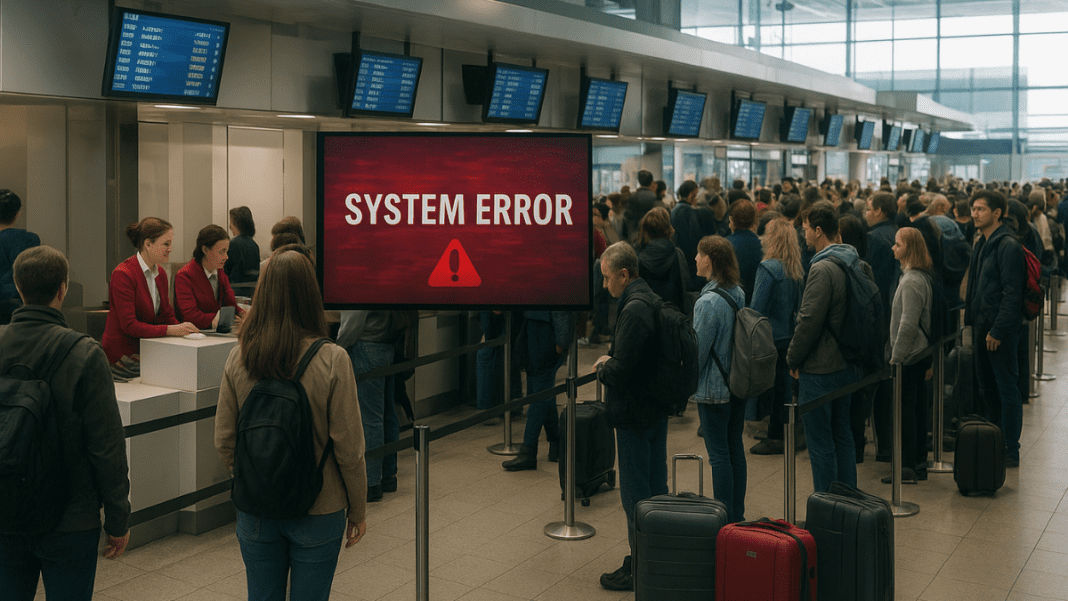A major disruption has hit airlines and passengers across Europe after a cyberattack targeted the airport systems of Collins Aerospace. The company, based in Charlotte, North Carolina, confirmed that its onsite passenger processing software was struck by a cyber “intrusion” on September 19.
Airlines Struggle With Disrupted Check-In Systems
The attack affected the MUSE system, which is used by several European airports. This platform plays a vital role in running passenger check-in counters, handling baggage, and managing boarding operations. When the system went offline, check-in desks at airports stopped working, baggage processing slowed down, and boarding was delayed.
Travelers reported long lines at airports, with many flights experiencing delays and some cancellations. For airlines, the outage meant ground staff had to fall back on slower manual methods, making it difficult to move passengers through the system smoothly.
Berlin airport was among the most heavily affected. Officials there stated that their check-in and baggage handling systems were still not fully operational days after the attack. They warned travelers of continued delays and possible cancellations as the systems were slowly being brought back online.
The disruption caused frustration among passengers, many of whom were stranded or faced hours of waiting in terminals. The incident showed how much modern air travel depends on reliable digital systems and how quickly things can unravel when those systems are disrupted.
Collins Aerospace Begins Restoration Work
Collins Aerospace, a subsidiary specializing in aviation technology, confirmed that it is now working to restore its affected software. The company said its teams are actively repairing the MUSE platform so that passenger check-in, baggage, and boarding processes can return to normal.
The disruption was not caused by a simple technical glitch but by a ransomware attack. In such attacks, hackers break into computer systems, lock critical data, and then demand payment in exchange for restoring access. This kind of cybercrime has become more common worldwide and often leads to major service interruptions.
Authorities confirmed that a man has been arrested in connection with the investigation. Details about the attacker, the method used, or whether data was stolen have not yet been released. Investigators are still examining the scale of the damage and how long the systems will take to fully recover.
Cyberattack cripples MUSE systems, throwing Berlin and Heathrow airports into travel chaos
For Collins Aerospace, restoring services is a complex task. The MUSE system supports multiple airports and airlines, meaning any downtime affects thousands of passengers. Teams are working around the clock to secure the platform, remove malicious software, and bring operations back online without risking further intrusions.
The company has not yet confirmed how many airlines or airports in total were affected. However, industry experts note that the outage is one of the most disruptive incidents to hit European airports in recent months.
Widespread Travel Disruptions Across Europe
The cyberattack had a ripple effect across the travel sector. More than just airlines were impacted, as ground handlers, security checks, and baggage loading also rely on connected systems. Without a working check-in platform, even simple tasks like issuing boarding passes became difficult.
Airports in different parts of Europe reported challenges. While some managed to set up backup systems, others struggled to cope with the sudden outage. Passengers faced long queues, missed connections, and confusion over delayed flights. Airline staff tried to guide travelers through manual check-in processes, but this took more time and caused bottlenecks at departure gates.
Airports thrown into turmoil as cyberattack crashes check-in backbone used by 100 airlines
The attack is part of a growing trend of cyber incidents targeting critical services in Europe. In the past year, hospitals, energy companies, and transportation hubs have all been hit by hackers. The Collins Aerospace case stands out because of the direct and immediate effect on passengers and flight operations.
For now, the focus remains on stabilizing the situation. Collins Aerospace engineers are gradually restoring the MUSE system, while airports continue to warn travelers about possible delays. Authorities are still investigating how the attack was carried out and what security gaps may have allowed it to happen.
The incident highlights the growing risks of cyberattacks on essential infrastructure. For travelers, it was a reminder of how dependent modern journeys have become on digital platforms—and how quickly those systems can be thrown into chaos when attacked.
